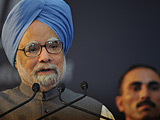Libya Exposes New Faultlines in Indian Foreign Policy
21 Apr 2011
By Harsh V Pant for ISN
The great tumult in the Middle East is testing the resolve of the international community in tackling difficult issues in the region. All major global powers are struggling with tough choices as they try to strike a balance between their values and strategic interests in crafting a response to the unfolding crisis in Libya. India is no exception.
Since India assumed non-permanent membership in the United Nations Security Council (UNSC) earlier this year, Libya has proven to be its first major diplomatic test. New Delhi supported Security Council Resolution 1970, which imposed sanctions on the Muammar Gaddafi regime, including a comprehensive arms embargo designed to prevent the direct or indirect supply, sale or transfer of arms and military equipment to Libya, as well as the freezing of economic resources "owned or controlled, directly or indirectly," by designated Gaddafi family members. But even this was not an easy choice given the domestic political sensitivities involved in India.
Principles and politics
As the UN discussion shifted toward the possibility of imposing a no-fly zone over Libya, New Delhi became more nervous, proclaiming the centrality of the principle of non-intervention in the internal affairs of other states. When it came time for a decision, India - along with Germany, Brazil, China and Russia - abstained from voting on Security Council Resolution 1973 that approved a no-fly zone over Libya and authorized "all measures necessary" to protect civilians from Gaddafi's forces. India external pagearguedcall_made that it could not endorse the drastic steps called for in the Resolution without hearing from the UN Secretary General's special envoy. It also underlined the African Union's attempt to end the crisis in a peaceful manner. India external pagecautionedcall_made that "the Resolution that the Council adopted authorizes far-reaching measures under Chapter VII of the UN charter with relatively little credible information on the situation on the ground in Libya." What was worse, India argued, the Resolution did not provide clarity about who would enforce it and how. Responding to reports that a possible solution could be the division of Libya, India insisted that Libyan sovereignty, unity and territorial integrity should be preserved.
Despite its status as world's largest democracy, India has largely watched the events unfold in the Middle East in silence. Much like China, India has traditionally resisted interventionist foreign policy doctrines emanating from the West and displayed conservative attitudes on the prerogatives of sovereignty.
Indian political parties have been reluctant to support military intervention in the Middle East in large part because of their sensitivity to the reaction of India's Muslim population. It seemed to matter little that in the case of Libya, a Muslim leader was killing his Muslim populace. "We are coming tonight," Gaddafi announced on television, referring to the rebel forces occupying Benghazi. "There won't be any mercy."
India also remained unconvinced that the intervention in Libya would lead to a swift, successful outcome - or even that the use of force would be effective at all. Furthermore, India was also discomfited by the sweeping breadth of the Resolution.
Stepping-up global engagement?
Yet, India claims to be a rising global power. America's endorsement of India's candidacy for permanent membership of the UNSC, and India's easy victory in its election to the Council as a non-permanent member, do indeed represent recognition of India's credentials as a major global power. But India still needs to convince the world that it has a legitimate claim to a permanent seat. During his visit to India last November, Obama asked India to take on larger responsibility on the world stage, in particular with regard to the promotion of human rights and democracy. Now in the spotlight, India is finding its actions on important global issues subject to close and critical scrutiny. India's decision to 'sit on the fence' with regard to Libya may perhaps arouse the suspicion that the emerging power remains unwilling to contribute to the management of global order. Moreover, the cleavage between India's much touted democratic credentials at home and its lack of leadership on democracy abroad seems to be widening. The world is taking note, especially as democracy is something that Indian leadership often underlines when distinguishing itself from another emerging power - China.
Developments in the Middle East will weigh heavily on India's future ties with the region, and right now Indian policy seems to be favoring the status quo. Once a new Libya emerges out of the present chaos, it is likely that India will have a tough time engaging with the forces that ousted Gaddafi. As a result, India will soon be forced to jettison its old foreign-policy assumptions and strike a delicate balance between the pursuit of its national interests and its responsibility as a rising power to help maintain global peace and stability. India's success in this endeavor will, to a large extent, determine its future profile on the global stage.

